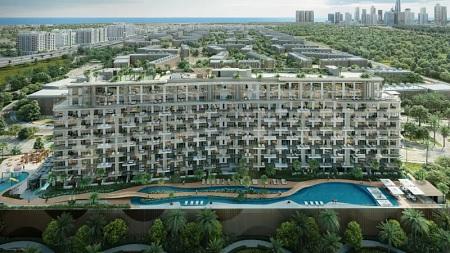Nestled in the heart of the desert, Dubai shines as an architectural marvel and a bustling center for real estate. Its exponential growth in recent decades has propelled the emirate’s property market to global acclaim.
With skyscrapers piercing the sky and man-made islands reshaping the coastline, Dubai’s real estate sector remains a magnet for investors, developers, and prospective homeowners alike.
Key characteristics of dubai’s real estate market
Dubai’s economy has undergone remarkable growth, evolving from a modest trading port to a vibrant modern city, with its real estate market influenced by various factors.
Diverse market segments
Dubai’s property market comprises different sectors such as residential, commercial, retail, and hospitality, each with its own trends and challenges, making the market complex.
International investors
The city attracts investors from around the world, each with distinct preferences and strategies, shaping the market’s complexity.
Government regulations
Government regulations shape Dubai’s property market, covering areas like ownership, visas, taxes, and foreign investment, influencing market dynamics and investor behavior.
Economic factors
Local and global economic conditions play a significant role in shaping Dubai’s property market. Variables such as GDP growth, employment rates, inflation, currency fluctuations, and oil prices can influence demand, supply, and pricing.
Infrastructure development
Dubai’s renowned infrastructure projects, from expansive transportation networks to urban renewal initiatives, significantly influence property values, accessibility, and demand across different areas.
Sustainability and technology
The increasing emphasis on sustainability and technological advancement is transforming Dubai’s property landscape. Integration of green building practices, smart technologies, and digital platforms adds complexity to the market as it adapts to these trends.

Dubai’s evolving real estate scene
The Dubai property market is influenced by consumer confidence and investor sentiment, shaping buying and selling decisions. Global economic trends and events also contribute positively, affecting interest rates and investment flows.
Fluctuating market trends
The market has experienced highs and lows, notably during the global financial crisis of 2008, marked by a construction boom and ambitious projects. However, post-crisis recovery efforts, including government interventions, stabilized the market, albeit at a slower pace. Additionally, the COVID-19 pandemic caused disruptions, impacting transaction volumes and prices.
Meanwhile, Dubai’s real estate sector remains robust, with consistent land supply driving investor interest.
Dubai’s top neighborhoods
The most sought-after neighborhoods in Dubai include Palm Jumeirah, Business Bay, Dubai Marina, Dubai Hills Estate, Downtown Dubai, Mohammed Bin Rashid City, and Jumeirah Village Circle. These areas are renowned for their luxury and diverse offerings, ranging from beachfront properties to family-friendly communities.
High property prices reflect Dubai’s appeal as a global city catering to various lifestyles, while intense competition among developers and investors drives innovation and dynamic market conditions.
